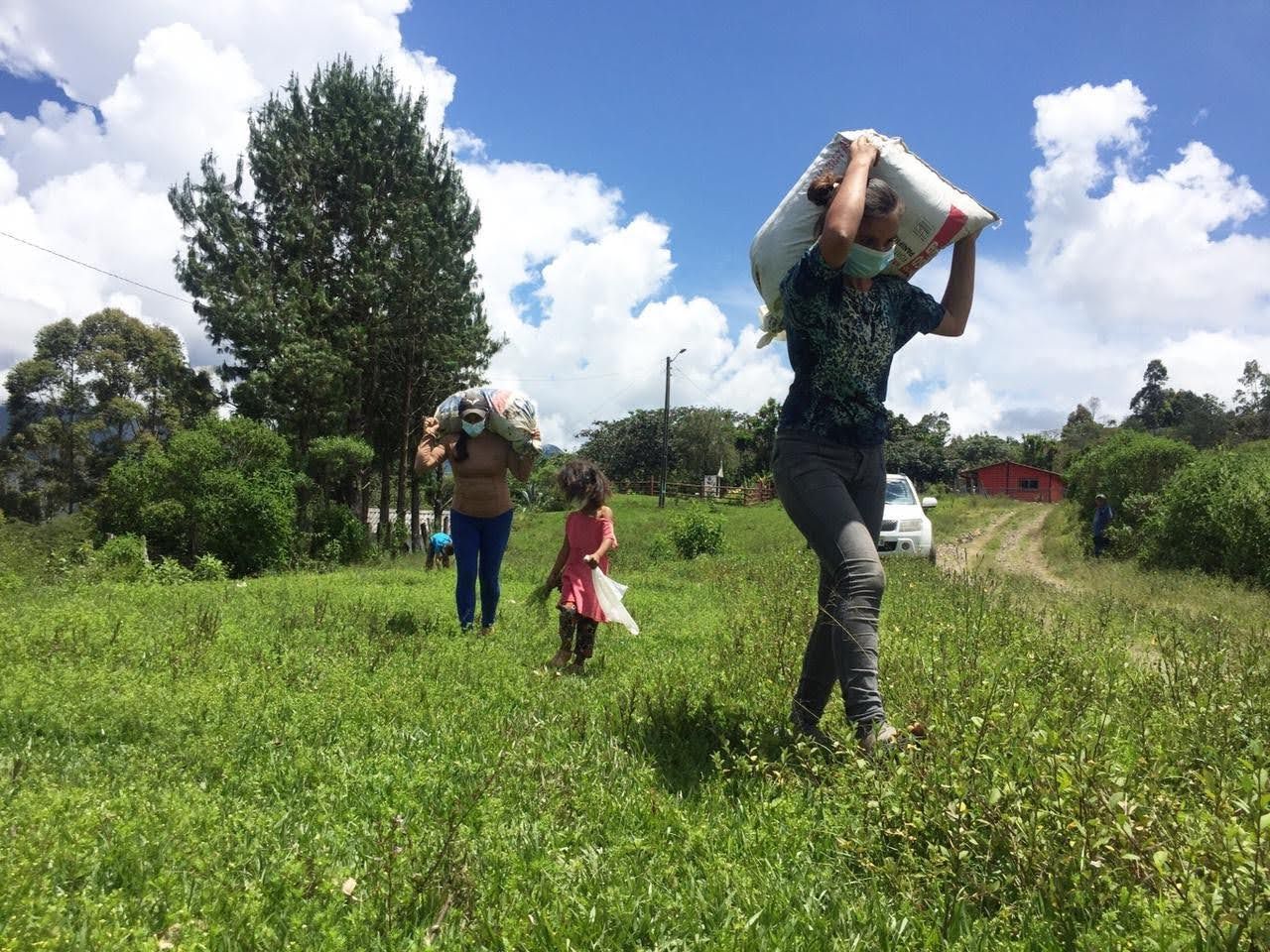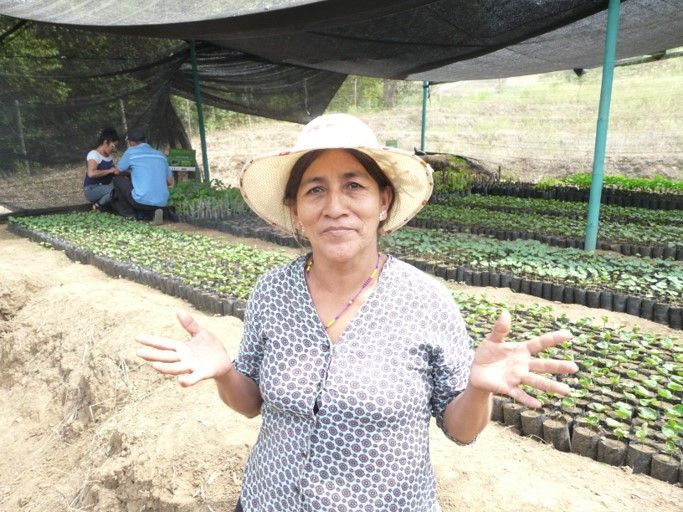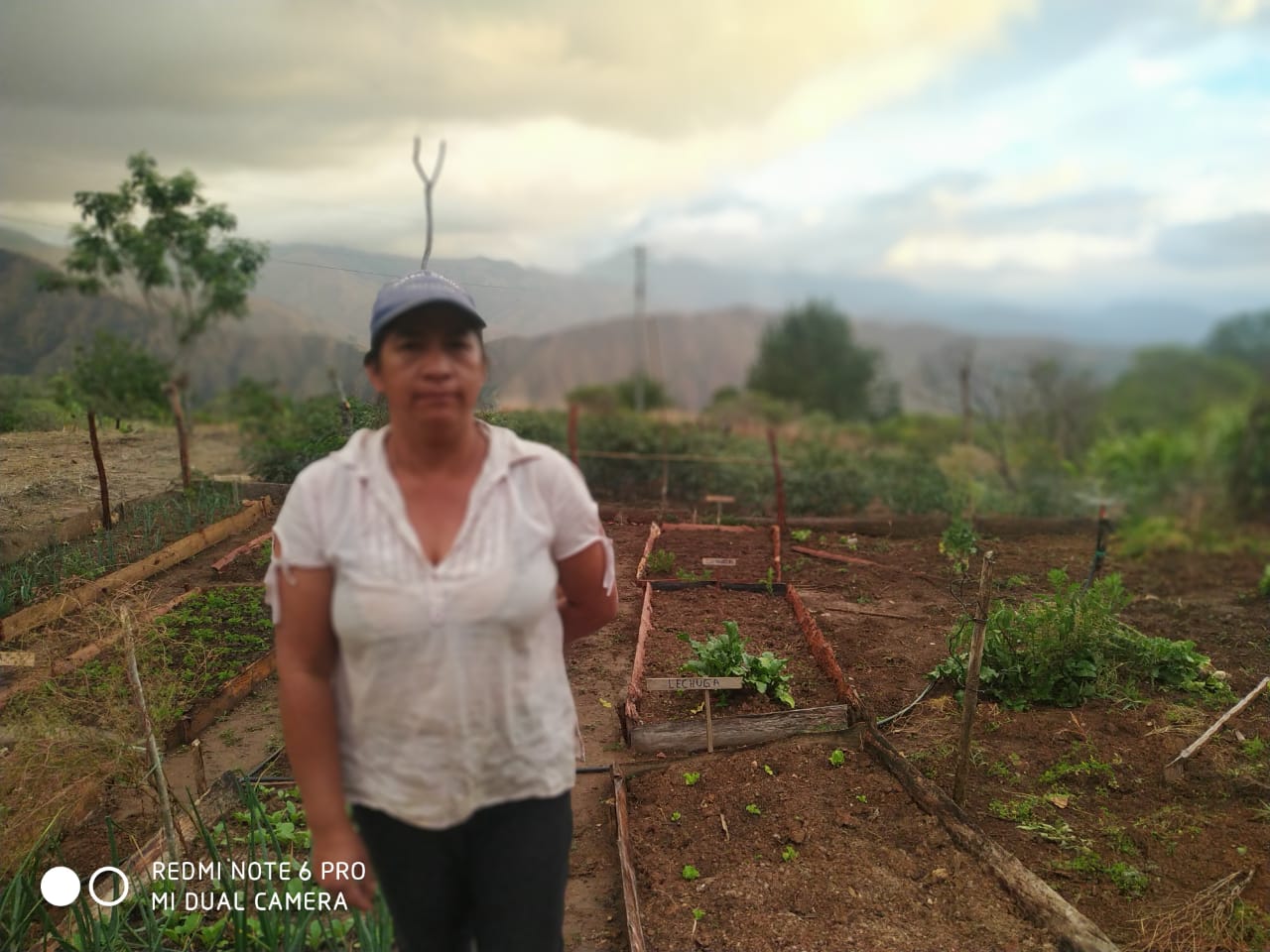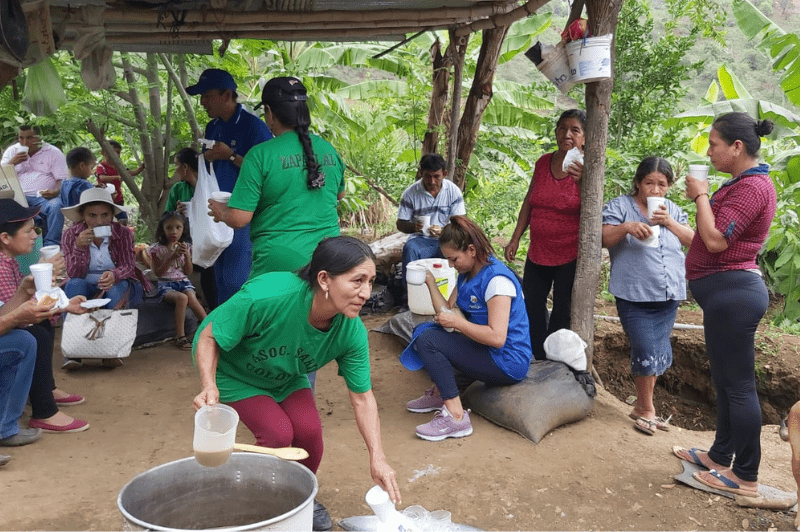With a beneficiary population of 238,713 inhabitants of Piura and Loja, of which 119,094 are men (49.89%) and 119,619 are women (50.11%), the project "Risk management without borders" incorporates the gender perspective as a tool for analysis and integrated planning in its activities.
11 June 2021. Loja, Ecuador.
Marilú Rivera, 44 years old, from the Fundochamba parish in the canton of Quilanga, recognises agriculture as an activity that not only feeds her family but also keeps them together. She works with her husband selling the produce from their agro-ecological garden, which helps them generate income for their family.
"My husband and I work in agriculture, we didn't produce before, but thanks to the articulation of the institutions through the Binational Risk Management without Borders Project, they give us the opportunity to harvest radishes, coriander, chard, and other vegetables".
Magdalena Flores, a resident of the Zapallal hamlet, located in the district of Suyo, in the Piura region of Peru. She is an enterprising woman, a fighter and leader of her people, who has come together with other women from the Santa Rosa community to form the Sarita Colonia Association of the El Chocolate sector, an association made up of women forgers who not only empower themselves to fight against climate change through reforestation, but also organise themselves to be resilient and autonomous through cocoa production and chocolate making, contributing to improving the family economy and the sustainable development of their people.
 These two stories are some of the testimonies of women beneficiaries of the binational project "Risk Management without Borders", which is implemented in 7 cantons and 3 parishes in the province of Loja, Ecuador, and in 17 districts of the Piura region in Peru, located in the Catamayo-Chira transboundary basin. This project has financial support from the European Union through the Euroclima Plus Programme, implemented by the Regional Government of Piura and the Provincial Government of Loja.
These two stories are some of the testimonies of women beneficiaries of the binational project "Risk Management without Borders", which is implemented in 7 cantons and 3 parishes in the province of Loja, Ecuador, and in 17 districts of the Piura region in Peru, located in the Catamayo-Chira transboundary basin. This project has financial support from the European Union through the Euroclima Plus Programme, implemented by the Regional Government of Piura and the Provincial Government of Loja.
EUROCLIMA+ recognises the importance of achieving gender equality and promoting women's empowerment through the actions and projects being developed by the disaster risk management component, implemented by the Spanish Agency for International Cooperation (AECID) and the French Development Agency (AFD).
Therefore, the binational technical team of the "Risk Management without Borders" project, after strengthening its capacities through technical tools received by Euroclima+, began and strengthened the process of incorporating the gender perspective as a cross-cutting process in the various activities of the project in both Peru and Ecuador.
Gender roles determine the opportunities, responsibilities, resources and competencies associated with being a man or a woman. However, given that women are often in a disadvantaged position, it is important to make visible their leading role in the development process, promoting equality and giving special attention to their leadership and empowerment as a real change for the development of their community.
Making the road to equality
What was the motivation for the Risk Management without Borders project to initiate gender mainstreaming in its activities??
When the project began, there were high expectations on the part of the local authorities in both Peru and Ecuador, because technical meetings were held, presentations were made and commitments were made to initiate operational actions in their localities. However, during the process, it was the women who showed the greatest interest in participating, as in the case of reforestation and the implementation of agro-ecological family gardens, because they saw an opportunity to contribute to the tasks of prevention, mitigation and repair of the damage caused by disasters. This situation motivated the identification and recognition of women's needs, contributions and capacities to reduce not only vulnerabilities in risk management, but also gender gaps across the board.
Where did the idea to explore the support of the virtual gender window come from? Had you already used the toolkit before applying for this support?
In February 2020, a meeting of the monitoring committee was held by AECID and a report was made on the consultancy for mainstreaming the gender perspective in the projects, through the virtual support window, for which the technical consultancy of the specialist Ana Rojas was provided. Since then, virtual sessions have been held to share the conceptual framework of gender; delve into issues focused on field work tools and the design of processes with a gender perspective; and reflection on institutional capacities, identifying corrective actions, strengthening capacities and providing follow-up to project activities..
Are there any experiences, tools or opportunities gained as part of the virtual support that you find valuable or wish to highlight?
During the sensitisation and training process facilitated by Euroclima+, an institutional analysis was carried out to identify strengths and weaknesses, as well as strategic alliances to carry out gender actions in the project field. In practice, the format of the disaster risk prevention and reduction plans was reviewed and modifications or elements for attention were suggested in order to achieve a greater identification of gender considerations in the content of these plans.
The virtual window allowed us to learn about tools for field work and the design and implementation of local participatory processes with a gender perspective, which facilitate the identification of vulnerabilities and information distribution processes for the various activities of each project component.
This project promotes activities for the identification of risks and the development of district risk management plans, many of these activities had already started prior to the virtual support. Have you been able to incorporate a gender perspective in these activities?
It is important to consider the gender perspective as a tool for analysis and comprehensive planning, since, during the post-disaster recovery period, many of the programmes and/or activities are not designed to meet the needs of women, especially in recovery efforts in a situation of equality, as many of them do not have access to basic services such as health, education, work, as well as being victims of harassment, violence and discrimination. Disasters also have a greater negative impact on women's life expectancy than on that of men.
Therefore, in the development of project activities such as governance and public policy workshops, formation of community committees, community risk management plans, home gardens, reforestation, risk reduction agendas, risk reduction prevention plans, reforestation, early warning systems, among others, it is important to take the following into account:
- Normative: Where norms are considered not only in risk management and climate change, but also in relation to gender and interculturality.
- Identification of actors: The participation of women leaders and decision-makers is encouraged, and information on actors disaggregated by sex is considered in operational activities, in relation to participation in workshops and meetings, among other activities.
Taking into account the project, the beneficiary population is 238,713 inhabitants of Piura and Loja, of which 119,094 are men (49.89%) and 119,619 are women (50.11%)..
- Methodology: Instruments or strategies that help participation for both men and women are considered, such as invitations, sex-disaggregated attendance lists or other material aimed at participants in awareness-raising, training activities and systematisation, etc.
- Awareness raising and training: In the participatory spaces, topics on gender equality and interculturality and their relation to disaster management are considered.
- Diagnostic: This takes into account sex-disaggregated information, analysis and interpretation, problems, opportunities, proposals, etc., for example: Illiteracy disaggregated by sex, assessment of how much risk affects or impacts women, among others.
- Proposals: Actions that contribute to women's recovery, empowerment and autonomy after a disaster. For example, in Early Warning systems, not all women have a radio, television or mobile phone in their homes to receive warning information, because they are dedicated to caring for the family, especially in rural areas.
Also, along this same line, could you comment on whether you have encountered any barriers to the implementation of gender activities? If so, what strategies have you used to address them?
The issue of the health emergency is and continues to be one of the main limitations that has made it difficult to develop field actions, which does not allow us to get closer to the population in order to be able to apply more tools in the field. However, through the consultancies that are developed, it is an indispensable requirement to consider strategies and/or apply tools so that the information or development of the activity has a gender perspective.
As this is a bi-national project, it is important to maintain the coordination of activities in both cross-border locations, could you also comment briefly on how you have organised yourselves within the project to ensure that gender mainstreaming is carried out?
In the framework of the training of the project's technical team, those responsible for the implementation and monitoring of gender-focused activities were identified, and therefore one person from Ecuador and another from Peru were assigned to coordinate actions and develop tools for their applicability in the field. On the Peruvian side, there are mechanisms and/or spaces where the gender approach is promoted as a regional policy, for example, the Regional Council for Gender Equality - CORIG and the Regional Technical Commission for Gender Mainstreaming - COTER, where the Project sees as a strength and opportunity to articulate actions and exchange experiences. In Ecuador, there are also alliances with some institutions, where the participation of women in the activities is promoted. This year, a binational meeting of producers will be organised, where women from various communities will share their experience in family farming, and a document has also been prepared on the experiences of women's participation in agro-ecological gardens entitled: MUJER RURAL, community linking of knowledge for the reduction of vulnerability among women of the Cariamanga parrish in Calvas canton, Loja province.
Finally, if you could give a suggestion to other similar projects on how best to integrate gender considerations into their work, what advice would you give them on how to go about this task??
It is important that gender equality is considered in a cross-cutting manner in each of the different programmes or projects, emphasising the objectives, with the aim of advancing towards the achievement of equitable and sustainable human development, with equal opportunities between men and women. The empowerment of women and the strengthening of their capacities turns them into autonomous and resilient women, with capacities to reduce disaster risks and mitigate the effects of climate change and to promote projects in their communities.
Magdalena Flores, a resident of the Zapallal hamlet, located in the district of Suyo, in the Piura region of Peru.

Marilú Rivera, from Fundochamba parish, in the canton of Quilanga, Loja province.

About the sector Disaster risk management sector: droughts and floods
The sector "Disaster risk management and reduction: droughts and floods" aims for the adoption of disaster risk management and reduction plans by national governments in Latin America to promote the integrated management of flood and drought risks in the context of climate change, taking as a reference the Sendai Framework for Disaster Risk Reduction 2015-2030 and the commitments adopted by the countries in their fight against climate change. See sector information: https://www.euroclima.org/en/risk-management
This sector of EUROCLIMA+ is driven by two implementing agencies: the Spanish Agency for International Development Cooperation (AECID) and the French Development Agency (AFD)..
Learn more about the Risk Management without Borders project
Contacts
For more information about EUROCLIMA+, contact Alexandra Cortés: This email address is being protected from spambots. You need JavaScript enabled to view it.
For information about the EUROCLIMA+ Risk Management component, write to This email address is being protected from spambots. You need JavaScript enabled to view it.
